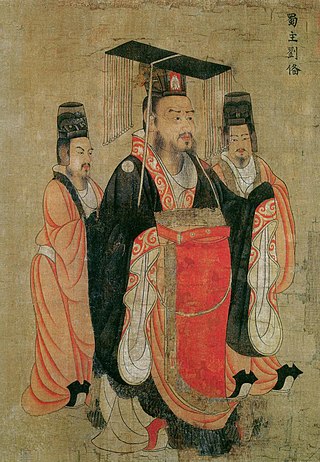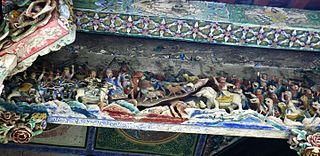Related Research Articles

Liu Bei, courtesy name Xuande (玄德), was a Chinese warlord in the late Eastern Han dynasty who later became the founding emperor of Shu Han, one of the Three Kingdoms of China.

Zhang Fei, courtesy name Yide (益德), was a Chinese military general and politician serving under the warlord Liu Bei in the late Eastern Han dynasty and early Three Kingdoms period of China. Zhang Fei and Guan Yu, who were among the earliest to join Liu Bei, shared a brotherly relationship with their lord and accompanied him on most of his early exploits. Zhang Fei fought in various battles on Liu Bei's side, including the Red Cliffs campaign (208–209), takeover of Yi Province (212–214), and Hanzhong Campaign (217–218). He was assassinated by his subordinates in 221 after serving for only a few months in the state of Shu Han, which was founded by Liu Bei earlier that year.

Zhuge Liang's Southern Campaign, also known as the War of Pacification in Nanzhong, was a military campaign which took place in 225 during the early Three Kingdoms period (220–280) of China. It was led by Zhuge Liang, the Imperial Chancellor of the state of Shu Han, against opposing forces in the Nanzhong region. The campaign was a response to rebellions started by local governors in the Nanzhong region and intrusions by the Nanman.

Meng Huo was a local leader in the Nanzhong region in the state of Shu Han during the Three Kingdoms period of China. He was popularly depicted as a local leader representing the gentries of the Nanzhong region, but some historians doubt his historical existence.

Pang Tong (179–214), courtesy name Shiyuan, was a Chinese politician who served as a key adviser to the warlord Liu Bei in the late Eastern Han dynasty of China. In his youth, Pang Tong was disregarded because he was plain-looking. The hermit scholar Sima Hui, however, held him in high esteem and called him the "Crown of Scholars in Jing Province". Pang Tong studied under Sima Hui along with Zhuge Liang, Xu Shu and Xiang Lang, and he was given the nickname "Fledgling Phoenix". Owing to his friendly attitude, he worked as an appraiser in Nan Commandery. When he reviewed someone, he would prioritise their virtues over their abilities and encourage them to help others.

Fa Zheng (176–220), courtesy name Xiaozhi, was a key adviser to the warlord Liu Bei in the late Eastern Han dynasty. Born in a family of high social status and of noble descent, Fa Zheng travelled to Yi Province in the late 190s and became a subordinate of Liu Zhang, the provincial governor. However, his feelings of alienation and perception of Liu Zhang as an incompetent governor eventually led him to betray Liu Zhang and defect to Liu Bei in 211. Between 211 and 214, Fa Zheng assisted Liu Bei in overcoming Liu Zhang and seizing control of Yi Province, and became one of Liu Bei's most trusted advisers. In 217, he urged Liu Bei to launch the Hanzhong Campaign to capture the strategic Hanzhong Commandery from a rival warlord, Cao Cao, but died a year after Liu emerged victorious in the campaign.

Jiang Wan, courtesy name Gongyan, was a Chinese military general, politician, and regent of the state of Shu during the Three Kingdoms period of China. Born in the late Eastern Han dynasty, Jiang Wan initially served as a scribe, county chief and county prefect under the warlord Liu Bei, who later became the founding emperor of Shu. After Liu Bei's son Liu Shan succeeded his father as emperor in 223, Jiang Wan gradually rose to prominence under the regency of Zhuge Liang, the Imperial Chancellor of Shu. Between 228 and 234, while Zhuge Liang was away leading Shu forces on the Northern Expeditions against Shu's rival state Wei, Jiang Wan took charge of internal affairs and provided logistical support to the Shu forces at the frontline. After Zhuge Liang's death in 234, Jiang Wan succeeded him as regent and did well in gaining the Shu people's confidence and leading them into a post-Zhuge Liang era. During this time, he considered that the land-based route through the Qin Mountains used by Zhuge Liang during the Northern Expeditions was too difficult for navigation and transportation of supplies. He thus came up with a plan to switch to a water-based route along the Han River targeting Wei territories in present-day southern Shaanxi and northwestern Hubei. However, the Shu government rejected his plan as they thought it was too risky. In 243, due to poor health, Jiang Wan relocated from Hanzhong near the Wei–Shu border to Fu County. Towards the final years of his regency, as his health worsened, Jiang Wan gradually relinquished his powers to his deputies Fei Yi and Dong Yun but he continued to rule as regent in name. He died in late 246 and was succeeded by Fei Yi.
Li Yan, courtesy name Zhengfang, also known as Li Ping, was a military general of the state of Shu Han during the Three Kingdoms period of China. He climbed to the zenith of his career when he was asked by the Shu emperor Liu Bei to be the military paramountcy and co-regent alongside Zhuge Liang for his son and successor, Liu Shan. After the death of Liu Bei, Li Yan was given the rank of General of the Vanguard which was last held by Guan Yu back in 220. Li served most of his career in the mid and late 220s as the area commander for the Eastern Front centered in Yong An with Chen Dao as his deputy; he never faced any major battles in his position. However, during the 230s and the 4th of Zhuge Liang's Northern Expeditions, Li Yan was given a higher rank of General of the Agile Cavalry, below only Zhuge Liang. He was assigned to handle logistics, but he was unable to deliver supplies to Zhuge Liang's army in a timely manner. After his attempt to fraudulently cover his inability to follow commands, Li Yan was stripped from positions and power.
Zhang Yi, courtesy name Junsi, was an official of the state of Shu Han in the Three Kingdoms period of China.
Huang Quan, courtesy name Gongheng, was a Chinese military general and politician of the state of Cao Wei during the Three Kingdoms period of China. He previously served under the warlords Liu Zhang and Liu Bei during the late Eastern Han dynasty and in the state of Shu Han during the early Three Kingdoms period before defecting to Cao Wei. Liu Bei relied heavily on Huang Quan for counsel in both domestic and foreign policy. Under the Wei government, however, Huang Quan was restricted to only internal affairs because even though the Wei emperor Cao Pi appreciated him for his talent, he doubted Huang Quan's allegiance and believed he was still secretly loyal to Liu Bei.
Fei Shi, courtesy name Gongju, was an official of the state of Shu Han during the Three Kingdoms period of China.

Dong Yun, courtesy name Xiuzhao, was a Chinese general and politician of the state of Shu Han during the Three Kingdoms period of China. His father, Dong He, also served as an official in Shu. Dong Yun was one of four persons who held positions equivalent to a head of government in Shu from 221 to 253; the other three were Zhuge Liang, Jiang Wan and Fei Yi.
Chen Dao, courtesy name Shuzhi, was a military general of the state of Shu Han in the Three Kingdoms period of China. He previously served under the warlord Liu Bei, the founding emperor of Shu Han, in the late Eastern Han dynasty.
Huo Yi, courtesy name Shaoxian, was a military general of the state of Shu Han in the Three Kingdoms period of China. His father, Huo Jun, served under Liu Bei, the founding emperor of Shu. During his service under the Shu emperor Liu Shan, Huo Yi suppressed tribal rebellions in the restive Nanzhong region and maintained peace in the area. After Shu was conquered by its rival state Cao Wei in 263, Huo Yi surrendered to the Wei regime and was permitted to remain in charge of keeping the peace in Nanzhong. In return, Huo Yi became a Wei subject and continued serving under the Jin dynasty, which replaced the Wei regime in 266.

Ma Zhong, courtesy name Dexin, originally named Hu Du, was a Chinese military general and politician of the state of Shu Han during the Three Kingdoms period of China. After Liu Bei's death, he served under Zhuge Liang during the Southern Campaign and helped to quell the rebellion. He was appointed as the area commander in the south after Li Hui's death where he spends most of his life pacifying the region, often with the help of Zhang Ni. Ma Zhong was known as generous and whimsical but also decisive in handling affairs. Hence the southern tribes both feared and respected him. His duty in the south could be comparable to Wang Ping in the north and Deng Zhi in the east. After his death, the foreigners sorely missed him and later established a temple in his honor.
Liu Bei's takeover of Yi Province was a military campaign by the warlord Liu Bei in taking control of Yi Province from the provincial governor, Liu Zhang. The campaign took place between the years 211 and 214 in the late Eastern Han dynasty; although the conflict between Liu Bei and Liu Zhang started in January or February 213 when the latter discovered the former secret communications and subsequently executed Zhang Song. It concluded with victory for Liu Bei and his successful takeover of the province from Liu Zhang in July 214. Yi Province would serve as the foundation of the state of Shu Han during the Three Kingdoms period.

The Conquest of Shu by Wei was a military campaign launched by the dynastic state of Cao Wei against its rival Shu Han in late 263 during the Three Kingdoms period of China. The campaign culminated in the fall of Shu Han and the tripartite equilibrium maintained in China for over 40 years since the end of the Eastern Han dynasty in 220. The conquest laid the foundation for an eventual reunified China under the Western Jin dynasty in 280.

The Hanzhong Campaign was a military campaign launched by the warlord Liu Bei to seize control of Hanzhong Commandery from his rival, Cao Cao. The campaign took place between December 217 and August 219 during the prelude to the Three Kingdoms period. Although Cao Cao's forces had settled in Hanzhong Commandery two years prior after the Battle of Yangping, they were worn out by an overall Fabian strategy employed by Liu Bei's forces, who used targeted attacks to capture strategic locations from the enemy. One of these attacks resulted in the death of Xiahou Yuan, one of Cao Cao's top generals, delivering a huge blow to the morale of Cao Cao's forces. Due to logistical and other issues, Cao Cao was eventually forced to abandon Hanzhong Commandery and order a retreat in June 219. Liu Bei emerged victorious in the campaign and occupied Hanzhong Commandery, after which he declared himself "King of Hanzhong" in August of that year.
Yang Xi, courtesy name Wenran, was a Chinese politician of the state of Shu Han during the Three Kingdoms period of China. He is best known for writing the Ji Han Fuchen Zan, a collection of praises of notable persons who served in the Shu Han state. Chen Shou, the third-century historian who wrote the Records of the Three Kingdoms (Sanguozhi), extensively quoted and annotated Yang Xi's collection.
Li Miao, courtesy name Hannan, was an official of the state of Shu Han during the Three Kingdoms period of China. He previously served under the warlord Liu Zhang and later Liu Bei in the late Eastern Han dynasty.
References
- ↑ de Crespigny (2007), p. 416.
- ↑ (李恢字德昂,建寧俞元人也。) Sanguozhi vol. 43.
- ↑ (華陽國志曰:習後官至領軍。) Huayang Guo Zhi annotation in Sanguozhi vol. 43.
- ↑ (仕郡督郵,姑夫爨習為建伶令,有違犯之事,恢坐習免官。太守董和以習方土大姓,寢而不許。) Sanguozhi vol. 43.
- ↑ Sima (1084), vol. 66.
- ↑ (後貢恢於州,涉道未至,聞先主自葭萌還攻劉璋。) Sanguozhi vol. 43.
- ↑ (恢知璋之必敗,先主必成也,乃託名郡使,北詣先主,遇於緜竹。) Sanguozhi vol. 43.
- ↑ (先主嘉之,從至雒城,遣恢至漢中交好馬超,超遂從命。) Sanguozhi vol. 43.
- ↑ Sima (1084), vol. 67.
- ↑ (成都旣定,先主領益州牧,以恢為功曹書佐主簿。) Sanguozhi vol. 43.
- ↑ (後為亡虜所誣,引恢謀反,有司執送,先主明其不然,更遷恢為別駕從事。) Sanguozhi vol. 43.
- ↑ Sima (1084), vol. 69.
- ↑ Herman, John (2009). "The Kingdoms of Nanzhong: China's Southwest Border Region Prior to the Eighth Century". T'oung Pao . 95 (4): 241–286. doi:10.1163/008254309X507052. ISSN 0082-5433.
- ↑ (臣松之訊之蜀人,云庲降地名,去蜀二千餘里,時未有寧州,號為南中,立此職以總攝之。晉泰始中,始分為寧州。) Pei Songzhi's annotation in Sanguozhi vol. 43.
- ↑ (章武元年,庲降都督鄧方卒,先主問恢:「誰可代者?」) Sanguozhi vol. 43.
- ↑ (恢對曰:「人之才能,各有長短,故孔子曰『其使人也,器之』。且夫明主在上,則臣下盡情,是以先零之役,趙充國曰『莫若老臣』。臣竊不自量,惟陛下察之。」) Sanguozhi vol. 43.
- ↑ (先主笑曰:「孤之本意,亦已在卿矣。」) Sanguozhi vol. 43.
- ↑ (方亡卒,先主問代於治中從事建寧李恢,對曰:「西先零之役,趙充國有言:「莫若老臣。」) Huayang Guo Zhi vol. 4.
- ↑ (遂以恢為庲降都督,使持節領交州刺史,住平夷縣。) Sanguozhi vol. 43.
- ↑ (先主遂用恢為都督,治平夷縣。) Huayang Guo Zhi vol. 4.
- 1 2 3 4 Sima (1084), vol. 70.
- ↑ (先主薨,高定恣睢於越嶲,雍闓跋扈於建寧,朱襃反叛於䍧牱。) Sanguozhi vol. 43.
- ↑ (丞相亮南征,先由越嶲,而恢案道向建寧。諸縣大相糾合,圍恢軍於昆明。時恢衆少敵倍,又未得亮聲息, ...) Sanguozhi vol. 43.
- ↑ (... 紿謂南人曰:「官軍糧盡,欲規退還,吾中間乆斥鄉里,乃今得旋,不能復北,欲還與汝等同計謀,故以誠相告。」) Sanguozhi vol. 43.
- ↑ (南人信之,故圍守怠緩。於是恢出擊,大破之,追犇逐北,南至槃江,東接䍧牱,與亮聲勢相連。) Sanguozhi vol. 43.
- ↑ (南土平定,恢軍功居多,封漢興亭侯,加安漢將軍。) Sanguozhi vol. 43.
- ↑ (後軍還,南夷復叛,殺害守將。) Sanguozhi vol. 43.
- ↑ (恢身往撲討,鉏盡惡類,徙其豪帥于成都,賦出叟、濮耕牛戰馬金銀犀革,充繼軍資,于時費用不乏。) Sanguozhi vol. 43.
- ↑ (建興七年,以交州屬吳,解恢刺史。更領建寧太守,以還居本郡。) Sanguozhi vol. 43.
- ↑ (徙居漢中,九年卒。) Sanguozhi vol. 43.
- ↑ (子遺嗣。) Sanguozhi vol. 43.
- ↑ Sima (1084), vol. 78.
- ↑ (恢弟子球,羽林右部督,隨諸葛瞻拒鄧艾,臨陣授命,死于緜竹。) Sanguozhi vol. 43.
- ↑ (評曰:...李恢公亮志業,...咸以所長,顯名發跡,遇其時也。) Sanguozhi vol. 43.
- Chen, Shou (3rd century). Records of the Three Kingdoms (Sanguozhi).
- Chang Qu (4th century). Chronicles of Huayang (Huayang Guo Zhi).
- Fan, Ye (5th century). Book of the Later Han (Houhanshu).
- Pei, Songzhi (5th century). Annotated Records of the Three Kingdoms (Sanguozhi zhu).
- Sima, Guang (1084). Zizhi Tongjian .
- de Crespigny, Rafe (2007). A Biographical Dictionary of Later Han to the Three Kingdoms 23-220 AD. Leiden: Brill. ISBN 9789004156050.